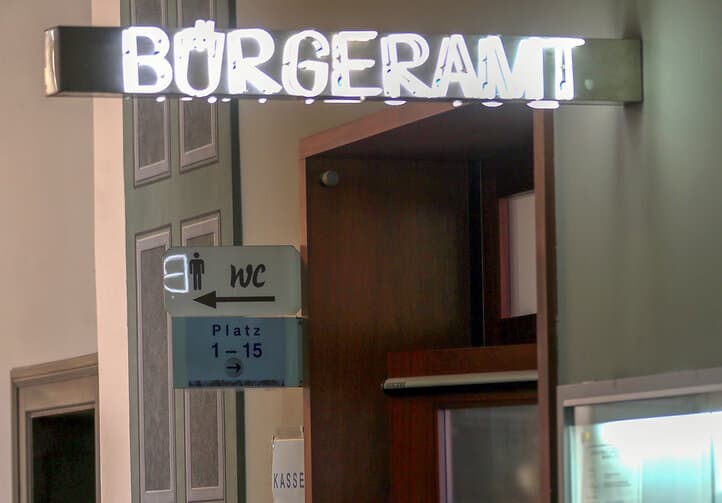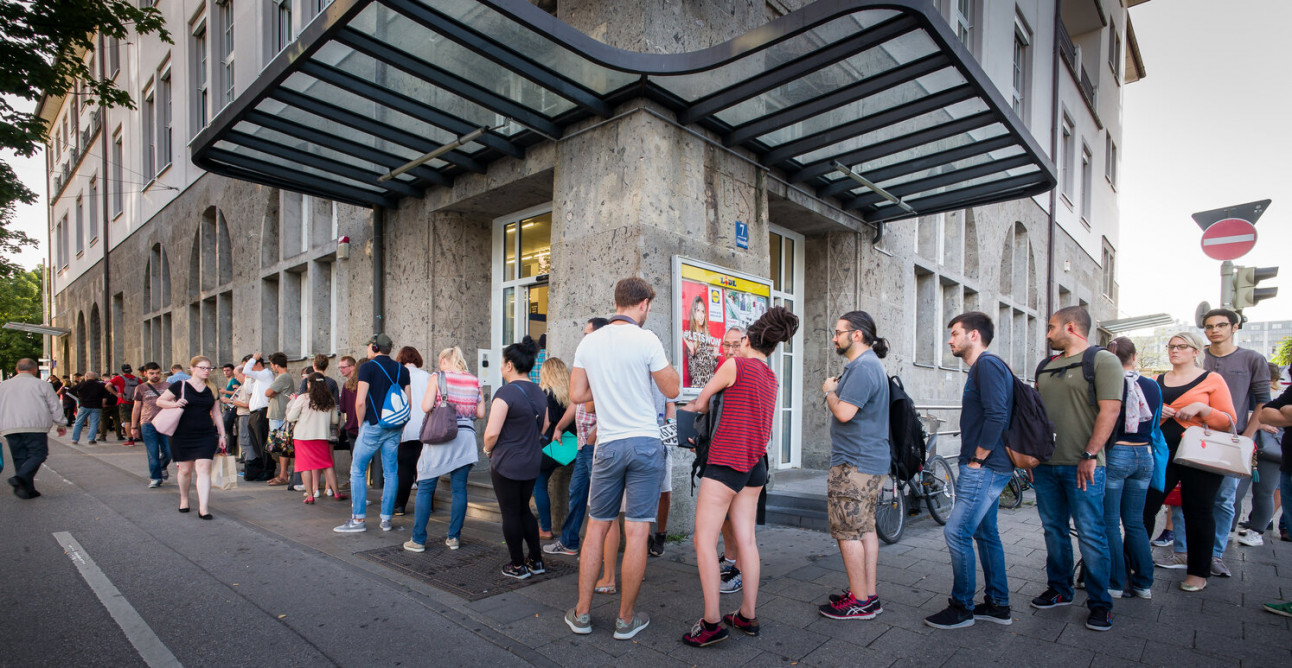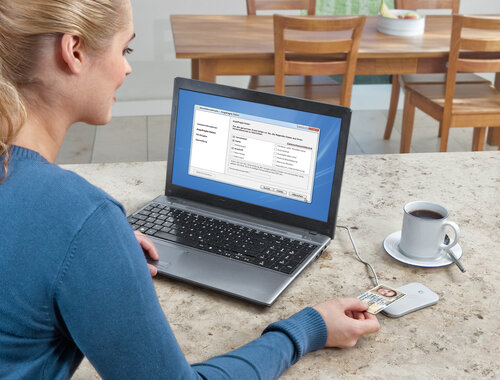EXPLAINED: What you need to know about dealing with German bureaucracy online

Digitalization is allowing people in many countries to deal with boring bureaucratic paperwork without having to queue up for hours at an office. Is Germany embracing this move?
While Germany might have a reputation abroad for efficiency everyone who lives here knows that the reality of dealing with state bureaucracies is rather different.
Especially in the German capital, waiting to get an appointment to register a new address can take weeks or even months. But other big cities have also had their problems with long queues.
So you might not be surprised to learn that Germany hasn’t exactly been a trailblazer in setting up a digital bureaucracy. In fact, a 2019 study of digitalization of state services across the EU put Germany in 26th place out of the (then) 28 member states.
The government has been making efforts to try and change things. In 2017 it brought in the Online Access Law, which guaranteed that residents and companies alike would be able to carry out a whole host of bureaucratic tasks online by the end of 2022.

A queue at a Munich Bürgeramt. Photo: DPA
The government pledged that the law would give Germany “the most user friendly administration in Europe.”
But things have been slow to change so far. A survey published by the Federal Statistics Agency in 2019 found that just 16 percent of Germans completed administrative tasks online. Slightly better was the news that 30 percent find the necessary forms online before printing them out and sending them in by post.
These numbers reflect the fact that here there is not very much administrative labour that can be done online. The most common task that can be completed is booking a physical appointment. But even here, it doesn’t really pay to do so.
Bild Zeitung reports that if you book online you normally have to make do with an appointment weeks later. If you phone in though, you can often get an appointment within days.
Digital IDs
The first attempt to move administrative tasks online came in a decade ago with the introduction of a digital ID card - initially only for German citizens and non-EU citizens.
The electric ID card (e-Perso), allows people to prove their identity online and perform minor tasks like applying for a pollution certificate for one’s car online. Non-EU citizens meanwhile could apply for an electronic residency card which opens the same functions.
Since 2017 the digital function is automatically enabled when your receive a new ID or residency card. The card can be read by an App on your smart phone.
That left a pretty big whole regarding the millions of EU citizens who live in Germany. But as of January of this year EU citizens can also apply for an eID card.

Using an eID card. Photo: DPA
You can apply for the eID at your local Bürgeramt. You will need to bring your passport and proof of address. All the details on how to apply for it can be found on this government website (frustratingly only in Germany). Important to know: the eID card for Europeans cannot be used as a travel document; it is solely for completing administrative tasks.
So far the digital ID has been something of a flop, with less than 10 percent of Germans actually using it. That’s partly because what it enables you to do changes drastically from state to state.
The federal website that provides info on what your e-Perso can do shows that some states offer far more services than others.
For example, in Bavaria you can in theory complete at least 30 administrative tasks via the Bayern-Portal.
The reality in Bavaria also means printing out forms and sending them to the relevant authority though, reports Bayerische Rundfunk (BR). For example, you can in theory apply for child benefits online but “you still have to print it out after filling it out and send it in by mail”, BR found.
North Rhine-Westphalia passed a law in March last year which committed it to putting all administrative tasks online by 2025. The billion euro investment will start by creating “model cities” in Aachen, Paderborn and Wuppertal which will each have a “digital Bürgeramt”.
"The services offered range from registering a new address, to registering school and daycare spots, to waste disposal and dog tax collection," NRW authorities claim.
Other states are further behind on the road to digitalization
In Berlin, there are just a handful of minor tasks that one can complete online. They include registering a new licence plate, applying for a pollution certificate for your car, and applying for student financial support.
READ MORE: How to understand the German 'Anmeldung'
Comments
See Also
While Germany might have a reputation abroad for efficiency everyone who lives here knows that the reality of dealing with state bureaucracies is rather different.
Especially in the German capital, waiting to get an appointment to register a new address can take weeks or even months. But other big cities have also had their problems with long queues.
So you might not be surprised to learn that Germany hasn’t exactly been a trailblazer in setting up a digital bureaucracy. In fact, a 2019 study of digitalization of state services across the EU put Germany in 26th place out of the (then) 28 member states.
The government has been making efforts to try and change things. In 2017 it brought in the Online Access Law, which guaranteed that residents and companies alike would be able to carry out a whole host of bureaucratic tasks online by the end of 2022.

A queue at a Munich Bürgeramt. Photo: DPA
The government pledged that the law would give Germany “the most user friendly administration in Europe.”
But things have been slow to change so far. A survey published by the Federal Statistics Agency in 2019 found that just 16 percent of Germans completed administrative tasks online. Slightly better was the news that 30 percent find the necessary forms online before printing them out and sending them in by post.
These numbers reflect the fact that here there is not very much administrative labour that can be done online. The most common task that can be completed is booking a physical appointment. But even here, it doesn’t really pay to do so.
Bild Zeitung reports that if you book online you normally have to make do with an appointment weeks later. If you phone in though, you can often get an appointment within days.
Digital IDs
The first attempt to move administrative tasks online came in a decade ago with the introduction of a digital ID card - initially only for German citizens and non-EU citizens.
The electric ID card (e-Perso), allows people to prove their identity online and perform minor tasks like applying for a pollution certificate for one’s car online. Non-EU citizens meanwhile could apply for an electronic residency card which opens the same functions.
Since 2017 the digital function is automatically enabled when your receive a new ID or residency card. The card can be read by an App on your smart phone.
That left a pretty big whole regarding the millions of EU citizens who live in Germany. But as of January of this year EU citizens can also apply for an eID card.

Using an eID card. Photo: DPA
You can apply for the eID at your local Bürgeramt. You will need to bring your passport and proof of address. All the details on how to apply for it can be found on this government website (frustratingly only in Germany). Important to know: the eID card for Europeans cannot be used as a travel document; it is solely for completing administrative tasks.
So far the digital ID has been something of a flop, with less than 10 percent of Germans actually using it. That’s partly because what it enables you to do changes drastically from state to state.
The federal website that provides info on what your e-Perso can do shows that some states offer far more services than others.
For example, in Bavaria you can in theory complete at least 30 administrative tasks via the Bayern-Portal.
The reality in Bavaria also means printing out forms and sending them to the relevant authority though, reports Bayerische Rundfunk (BR). For example, you can in theory apply for child benefits online but “you still have to print it out after filling it out and send it in by mail”, BR found.
North Rhine-Westphalia passed a law in March last year which committed it to putting all administrative tasks online by 2025. The billion euro investment will start by creating “model cities” in Aachen, Paderborn and Wuppertal which will each have a “digital Bürgeramt”.
"The services offered range from registering a new address, to registering school and daycare spots, to waste disposal and dog tax collection," NRW authorities claim.
Other states are further behind on the road to digitalization
In Berlin, there are just a handful of minor tasks that one can complete online. They include registering a new licence plate, applying for a pollution certificate for your car, and applying for student financial support.
READ MORE: How to understand the German 'Anmeldung'
Join the conversation in our comments section below. Share your own views and experience and if you have a question or suggestion for our journalists then email us at [email protected].
Please keep comments civil, constructive and on topic – and make sure to read our terms of use before getting involved.
Please log in here to leave a comment.